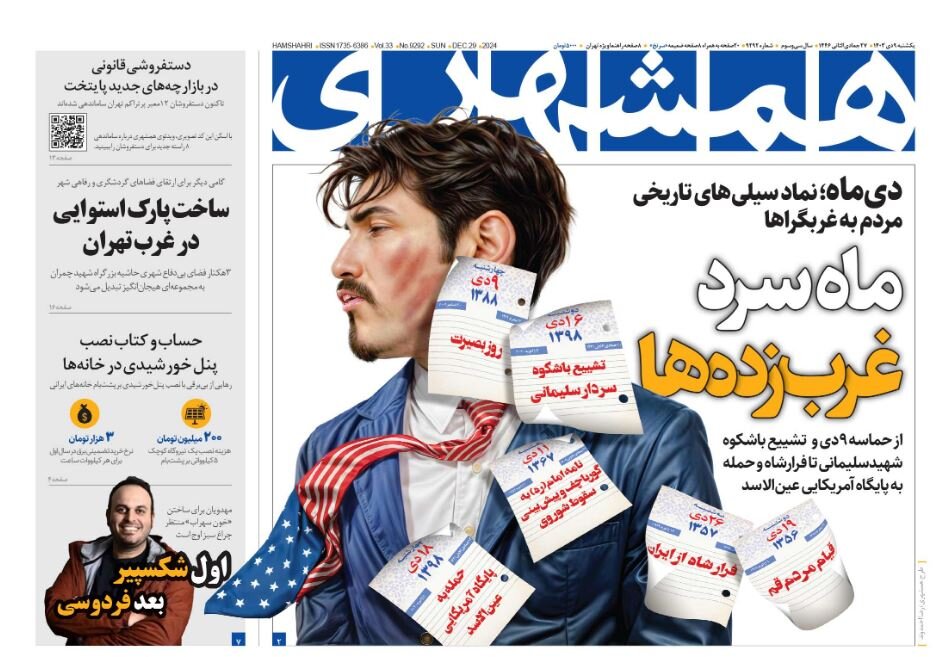Strategic confrontation with new round of hostilities

TEHRAN - In a note, Hamshahri discussed Iran's strategic confrontation with the new round of hostilities against the Islamic Republic by the West.
It said: What emerges from the recent positions of figures close to Trump is that the future American government intends to repeat the failed experience of increasing pressure against Iran and implement the policy of "maximum pressure" against Tehran. In such a situation, it seems that Tel Aviv and the European troika will play the role of Washington's two auxiliary wings. Therefore, experts believe that the future American administration will focus on “Iran's nuclear activities, the axis of resistance, and the Islamic Republic's missile program" as the main tools of pressure against Iran. In such a situation, deepening strategic relations with Russia and China is an important tool as the three countries more or less share common views in facing the United States. On this basis, in recent days, we have witnessed significant diplomatic movements in this area.
Donya-ye-Eqtesad: Iran's importance in China's security structure
Donya-ye-Eqtesad said China's support for Iran's efforts to regain its power and influence is significant as Iran has suffered blows to its allies, particularly Hamas and Hezbollah, at the hands of Israel. China would like to see a regional security structure established on balance of power, with Iran as a strong pillar and as China's partner in countering the dominance of the United States in regional security affairs; therefore, weakening Iran is not favorable based on this approach. In the future, China may prioritize restoring Tehran's power to maintain the regional power balance. This could require importing more crude oil from Iran, investing more in Iran's infrastructure, and supporting the country's regional approach. Chinese officials acknowledge that allies such as Russia, North Korea, and Iran have more in common with China in terms of interests rather than the United States. China will not allow Tehran to fail, especially since Beijing's relationship with Tehran is likely to help balance Saudi Arabia's relationship with the United States and Israel.
Siasat-e-Rooz: The need to stay on the right side of history
In its editorial, Siasat-e-Rooz addressed developments in Syria and other countries in the region. It wrote: West Asia is still the main focus of attention in the world, while the behavior of some countries in the region shows the ideas that have been formed after the developments in Syria. One of the notable points in this process is the claim of some Arab countries, including the Arab League, about Iran's role in Syria. They have accused Tehran of interfering in Syrian affairs and demanded that Iran distance itself from these developments. Iran is worried about sedition and excuses to divert public and regional minds towards unrealistic threats. Today, the West aims to implement its hegemonic goals by spreading division in the region. Experience has shown that the dream of the West and the Zionists is the destruction of the entire region, and there are no exceptions. In such a situation, the countries in the region should know that the right side of history is to side with the resistance front, which ultimately determines the fate of the region.
Iran: Ties between Iran and China reflect strategic alignment
In a commentary, the Iran newspaper dealt with Foreign Minister Araghchi's visit to China. The paper said: Araghchi's visit to Beijing at this juncture shows the sitting government’s pragmatist foreign policy approach. The 25-year strategic partnership agreement between Iran and China confirms the fact that the two countries, despite having different views on regional issues in West Asia, have reached a common understanding about the importance of strengthening bilateral interactions in various areas to advance their goals and secure their interests. The relationship between Iran and China reflects a strategic alignment. Since China's Middle East policy within the framework of the Belt and Road Initiative is focused on promoting economic cooperation and stability in the region, constructive cooperation with Iran will play a significant role in advancing this approach. China is one of the five countries with veto right in the UN Security Council, and its large economy has made China the first trade partner of our country. Therefore, China has provided Iran with a significant capacity to reduce the sanctions pressure.
Leave a Comment